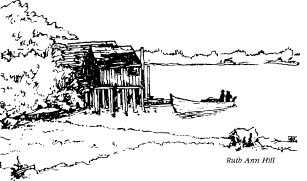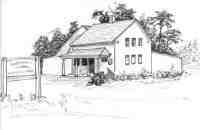Farming With
Clem Dunning
Clem's full name is Clement Dunning.
He was born in the house that he lives in now in
1916. His parents' names were William and Mary
Dunning. He has two sisters, Nellie and Annie and he
had one brother, John. Nellie lives in Presque Isle
and Annie lives in Topsham. John is no longer
living. The barn at the Dunning Farm was built in
1831 and it is 123 years old. The house was built in
1887 and it is 111 years old.
Clem's ancestors first came to
Harpswell in 1734 and lived in what is now the
oldest house in Harpswell. It is the house that is
just before the Mountain Road bridge. It is the same
house that Henry Barnes grew up in.
The Dunning Farm had cows, horses,
sheep and hogs. They raised vegetables and hay for
cattle. They raised potatoes, tomatoes, carrots,
cabbages, turnip and other vegetables. The hay was
used to feed the stock. The Dunnings had sheep for
wool and hogs for meat. They ate the things they
grew and sold some of it too. They also sold milk
and Clem's mother made butter to sell.
The Dunnings had to carry water from
the well and it was hard work. Clem said, “We had no
running water unless your mother sent you running to
get a pail of water.” Everything was done by hand.
The roads weren't plowed in the
wintertime. Clem's father used to go on the road
with a big snow roller pulled by horses. The roller
packed the snow down and made it easier for sleds
and sleighs to go on the roads.
Boys had to milk cows by hand, fill
the wood box, feed the animals before they went to
school in the morning and when they came back at
night. Girls helped with cooking and other chores in
the house. These were family chores and Clem and his
brother and sisters didn't get paid.
When Clem Dunning was a boy he used
to like to horseback ride and play baseball and
handball with a rubber ball. In May groups of kids
used to hang many baskets. May baskets would be
filled with candy. Kids would hang a basket on the
doorknob and yell, “May basket!” The kids in the
house had to find the others who were usually
hiding. Then they would chase them and catch them
and maybe eat part of the candy
When Clem was a boy hay was mowed by
a machine which was pulled by a horse. It was dried
in the sun and had to be pitched by hand. Later
trucks were used. Now hay is raked by machine. It is
baled by a baler and stacked in the barn.
During the summer sheep were often
put on Whites Island or Ragged Island for pasture.
The sheep roamed all over the island and ate freely.
This was a lot easier for the farmer because they
didn't have to take care of them or build fences.
Clem said that there's a bog
difference in farm equipment today. Farmers used to
depend on horses and sometimes oxen. Machinery of
today is a lot easier and a lot faster to use.
Clem went to the North Harpswell
School for his elementary education. It was across
from the Mountain Road. School lasted form 9:00 a.m
to 4:00p.m. There was no electricity back then, so
on winter days students and the teachers had trouble
seeing by 3:00 p.m. One of Clem's teachers lived on
High Head. In those days schools didn't close on
stormy days, so when it snowed that teacher had to
come to school on snowshoes.
There was work to do on the farm in
every season. In spring the ground had to be ready
for planting. In the summer the Dunnings had to cut
the hay and take care of the garden. Hay had to be
taken care of by hand and put into the barn. In the
fall they had to get livestock ready for winter, and
they also got the house etc. ready for winter. There
was snow to he shoveled.
During high school Clem went to
Brunswick High which was on Federal St. where
Hawthorne School is now The school was over crowded
so when Clem was in the 9th grade he went to school
only in the afternoon. The following year he went in
the morning. After that the high school on Spring
St. was built.
Clem went to the University of Maine
in Orono. He studied agriculture and had subjects
such as physics, chemistry, and farm management.
World War Two started in 1941 and lasted until 1945.
Clem left college and was in the service. After the
war was over he finished college. He jokingly says,
“It took nine and a half years for me to get through
college.”
Clem's first job after finishing
school was making ice cream. He got to eat all the
ice cream that he wanted. After that he worked for
the University of Maine for thirty-eight years
helping farmers in the state and teaching them new
methods of farming and helping in many other ways.
During that time he lived in
Aroostook County, in the city of Bangor, and later
in Yarmouth. When he retired he moved back to the
farm in Harpswell. Clean mentioned the big forest
fires of nineteen forty‑seven that were all over the
state of Maine from Fort Kent in northern Maine to
the very southern part of the state. The fires
caused a lot of destruction.
Clem and his wife, Marjory, had one
daughter and now have three grandchildren and four
great grandchildren.
Clem said, “I liked farming very
much and I liked being able to help other farmers in
the state do better.” He always liked to see the
land and the vegetables and the animals grow. He
also liked to eat what he grew. The only thing that
he didn't like was getting out of bed in the morning
at five thirty a.m.
During Clem's lifetime farming
changed from an animal industry to one of machinery.
The invention of automobiles made a big change in
everyone's lives.

